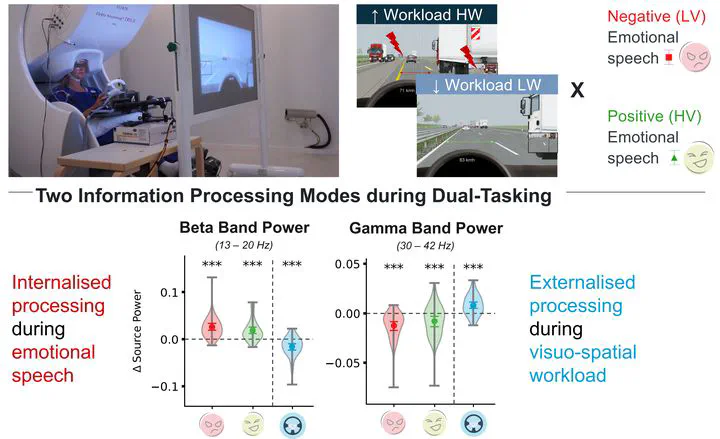Neural and Pupillary Oscillations of External and Internal Information Processing Modes during Emotional Speech Processing and Visuo-spatial Workload

Our daily lives require us to constantly attend to, select, and process relevant information from multiple sensory streams, such as listening to an audiobook while driving in traffic. Oscillatory activity in specific frequency bands determines stimulus-driven bottom-up and top-down processing. Recently, aperiodic measures and pupillary oscillations have also been linked to top-down and bottom-up auditory processing at different complexities. However, very few neurophysiological studies have investigated the processing of naturalistic stimuli such as emotional speech in dynamic scenarios. Moreover, no study has yet integrated neural and pupillary correlates.
Using whole-head magnetoencephalography and eye-tracking (N = 48), we examined how emotional speech and visuo-spatial workload co-modulate neural and pupillary activity during simulated driving. We hypothesised an increase in periodic alpha and beta band power, aperiodic measures (broadband, slope, and offset), and the index of pupillary activity (IPA) during emotional compared to neutral speech (internal mode). Periodic gamma oscillations were expected to decrease in parietal areas related to spatial processing.
Conversely, for high compared to low visuo-spatial workload drives, we hypothesised increased gamma and theta band power along with pupil dilation (external mode). Main effects of emotional speech and workload in the spatial permutation-based clustering of MEG source power and correlational analyses supported the hypotheses regarding co-modulations and two processing modes. While internalised processing for emotional speech is likely associated with anticipatory listening, social cognition, and emotional appraisal, the increased external mode under high visuo-spatial workload reflects cognitive strain and the allocation of c